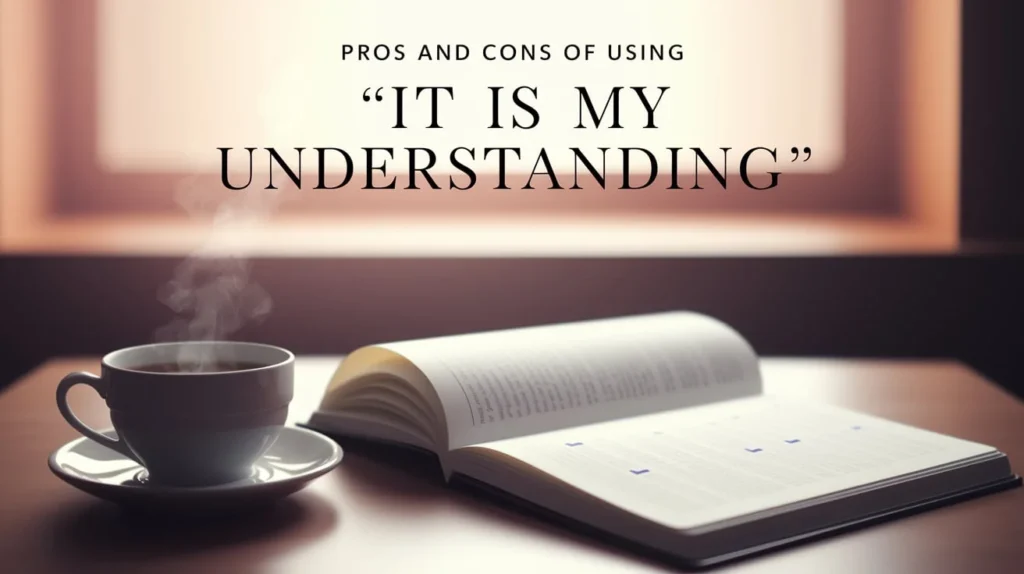Finding the right words to express yourself can make all the difference in how your message is received. Whether in personal conversations or professional emails, choosing warm, thoughtful phrasing helps build connection and trust. The phrase “It is my understanding” is often used to clarify information or express a perspective, but there are many ways to say it with more care and warmth.
This article explores 20 alternative phrases to express the same idea while adding sincerity and empathy to your communication.
What Does “It Is My Understanding” Mean?
The phrase “It is my understanding” is used to express what you believe to be true based on the information you have. It indicates that your statement is based on what you have heard, read, or inferred but may not be an absolute fact.
It is often used in both professional and casual settings when you want to share knowledge while leaving room for clarification or correction.
Is It Professional/Polite to Say “It Is My Understanding”?
Yes, “It is my understanding” is professional and polite. It is commonly used in business emails, workplace discussions, and diplomatic conversations where you want to present information without sounding overly assertive.
However, depending on the context, it may sound a bit formal or distant. If you want to come across as more approachable, choosing an alternative with a warmer or more engaging tone can be beneficial.
Pros and Cons of Using “It Is My Understanding”

Pros:
- Sounds professional and respectful
- Allows room for discussion and clarification
- Helps convey information without sounding too rigid
Cons:
- Can sound overly formal or distant
- May not feel warm or personal in certain contexts
- Could make communication feel less engaging
Synonyms For “It Is My Understanding”
- From what I gather
- As far as I know
- It appears to me that
- To the best of my knowledge
- Based on what I know
- What I’ve come to understand is
- If I’m not mistaken
- From my perspective
- As I understand it
- It seems to me that
- To my knowledge
- The way I see it
- What I believe to be true is
- From my experience
- I have been led to believe that
- It has been conveyed to me that
- What I gather from this is
- From the information I have
- What I’ve learned is
- My impression is that
1. From What I Gather
Sometimes, we form our understanding based on conversations, research, or indirect information. “From what I gather” conveys that you’ve pieced together knowledge from various sources, making it sound thoughtful and open-ended.
Scenario Example :
Subject: Confirmation of Project Deadline
Dear [Recipient],
From what I gather, the deadline for the project remains set for March 15. Could you confirm if this is still accurate? I want to ensure we are aligned.
Best,
[Your Name]
Best Use:
- When summarizing information from multiple sources
- When you’re sharing what you believe to be true but are open to correction
Additional Note:
This phrase is conversational yet professional, making it great for both workplace and casual use.
2. As Far as I Know
This phrase gently communicates that your knowledge is based on what you have been informed of so far. It expresses a degree of uncertainty while still providing helpful input.
Scenario Example :
Subject: Availability of Resources
Dear [Recipient],
As far as I know, the requested resources should be available by next week. Let me know if you need me to double-check with the logistics team.
Best,
[Your Name]
Best Use:
- When you want to sound informative but leave room for updates
- When you’re sharing knowledge that could be subject to change
Additional Note:
This phrase is polite and suitable for formal and informal conversations.
3. It Appears to Me That
This phrase helps you express your perception of a situation without sounding too definitive. It’s useful when making observations or offering an informed opinion.
Scenario Example :
Subject: Client Feedback on Proposal
Dear [Recipient],
It appears to me that the client is leaning toward the second option. Would you like to schedule a follow-up to discuss any revisions?
Best,
[Your Name]
Best Use:
- When sharing observations in professional or personal discussions
- When expressing a view that is open to interpretation
Additional Note:
This phrase is soft yet confident, making it ideal for professional communication.
4. To the Best of My Knowledge
This phrase reassures the listener that you are sharing the most accurate information based on what you know at the moment.
Scenario Example :
Subject: Policy Update Confirmation
Dear [Recipient],
To the best of my knowledge, the updated policy will take effect on April 1. If needed, I can check with HR for further confirmation.
Best,
[Your Name]
Best Use:
- When providing information but acknowledging that it may need verification
- When discussing facts that could require double-checking
Additional Note:
It is commonly used in legal, professional, and formal settings.
5. Based on What I Know
When you want to communicate that your statement is informed by your current knowledge, “Based on what I know” is a great alternative. It subtly acknowledges that there may be more information out there while still providing a level of confidence.
Scenario Example :
Subject: Update on Budget Allocation
Dear [Recipient],
Based on what I know, the budget for this quarter has already been finalized. However, I can check with the finance team if you need further clarification.
Best,
[Your Name]
Best Use:
- When you want to share what you believe to be true but remain open to further updates
- In both professional and personal discussions
Additional Note:
This phrase keeps your communication informative and flexible, making it easy to adapt to different contexts.
6. What I’ve Come to Understand Is
This phrase is useful when you want to express that your understanding has evolved over time. It makes your statement feel more personal and insightful.
Scenario Example :
Subject: Clarification on Training Process
Dear [Recipient],
What I’ve come to understand is that the new training process will include additional mentorship sessions. I’d be happy to share more details if needed.
Best,
[Your Name]
Best Use:
- When sharing something you’ve learned over time
- When you want to make your response sound more thoughtful and engaging
Additional Note:
This phrase works well when you’re expressing growth in knowledge or perspective.
7. If I’m Not Mistaken
This phrase adds a polite and cautious tone to your statement. It subtly invites correction, making it ideal for situations where you want to avoid sounding too sure of yourself.
Scenario Example :
Subject: Meeting Time Confirmation
Dear [Recipient],
If I’m not mistaken, our next meeting is scheduled for Thursday at 10 AM. Please let me know if that’s correct!
Best,
[Your Name]
Best Use:
- When you want to express information without making a definitive claim
- When you’re unsure but still want to offer input
Additional Note:
This phrase makes your message sound considerate and open to discussion.
8. From My Perspective
This alternative shifts the focus to your viewpoint, making it especially useful when discussing opinions or interpretations.
Scenario Example :
Subject: Thoughts on Project Strategy
Dear [Recipient],
From my perspective, the current strategy is effective, but we may need to refine our marketing approach. Let me know what you think!
Best,
[Your Name]
Best Use:
- When sharing a personal or professional viewpoint
- In discussions where multiple interpretations are possible
Additional Note:
This phrase adds a subjective and conversational touch to your communication.
9. As I Understand It
If you want to communicate that your statement is based on your interpretation of the information available, this phrase is a great choice.
Scenario Example :
Subject: Policy Implementation Details
Dear [Recipient],
As I understand it, the new policy will take effect starting next month. Let me know if I should verify any details.
Best,
[Your Name]
Best Use:
- When you want to acknowledge that your understanding is based on available details
- When you want to phrase your statement in a diplomatic way
Additional Note:
This phrase is professional yet approachable, making it a good fit for most settings.
10. It Seems to Me That
This phrase subtly expresses that your statement is based on your interpretation of the situation, without asserting it as absolute truth.
Scenario Example :
Subject: Observations on Market Trends
Dear [Recipient],
It seems to me that the demand for this product is steadily increasing. Should we explore expanding our offerings?
Best,
[Your Name]
Best Use:
- When making observations or interpretations
- When you want to sound thoughtful but not overly assertive
Additional Note:
This phrase works well in business discussions and personal conversations alike.
11. To My Knowledge
This phrase helps you state what you believe to be true at the moment while acknowledging that your information may not be complete.
Scenario Example :
Subject: Contract Renewal Status
Dear [Recipient],
To my knowledge, the contract renewal process has already begun. I can confirm with the legal team if needed.
Best,
[Your Name]
Best Use:
- When you want to sound credible but not absolute
- In professional discussions where accuracy is important
Additional Note:
This phrase is commonly used in legal, academic, and business settings.
12. The Way I See It
This phrase makes your statement more personal and reflective, making it a good choice for expressing opinions or interpretations.
Scenario Example :
Subject: Suggestions for Team Workflow
Dear [Recipient],
The way I see it, adjusting our workflow could help improve efficiency. I’d love to hear your thoughts on this.
Best,
[Your Name]
Best Use:
- When sharing personal insights or perspectives
- In discussions where multiple viewpoints matter
Additional Note:
This phrase makes your communication feel natural and engaging.
13. What I Believe to Be True Is
This phrase is helpful when you want to express a belief while acknowledging that it may not be absolute truth. It conveys sincerity and thoughtfulness.
Scenario Example :
Subject: Understanding of Company Policy
Dear [Recipient],
What I believe to be true is that employees are eligible for reimbursement for work-related travel expenses. However, I can check with HR to confirm the details.
Best,
[Your Name]
Best Use:
- When expressing something you strongly believe but want to verify
- In professional or personal discussions where accuracy matters
Additional Note:
This phrase adds a personal and confident tone, making it useful in situations where you want to sound assured yet open-minded.
14. From My Experience
This alternative shifts the focus to your past encounters, making it ideal for discussions where personal insights are valuable.
Scenario Example :
Subject: Advice on Handling Client Concerns
Dear [Recipient],
From my experience, clients appreciate prompt follow-ups when concerns arise. A quick call or email can make a big difference.
Best,
[Your Name]
Best Use:
- When sharing personal insights or lessons learned
- When advising or mentoring someone based on past experiences
Additional Note:
This phrase is especially effective in leadership, coaching, and advisory roles.
15. I Have Been Led to Believe That
If you want to express that your understanding is based on information received from others, this phrase is a great choice.
Scenario Example :
Subject: Status of Project Approval
Dear [Recipient],
I have been led to believe that the project has already received initial approval. Would you be able to confirm this?
Best,
[Your Name]
Best Use:
- When your information comes from second-hand sources
- When you want to express a degree of uncertainty
Additional Note:
This phrase is polite and diplomatic, making it ideal for professional communication.
16. It Has Been Conveyed to Me That
This phrase is useful in formal settings where you want to indicate that your knowledge comes from an official or trusted source.
Scenario Example :
Subject: Departmental Restructuring Update
Dear [Recipient],
It has been conveyed to me that our department will undergo restructuring next quarter. I’d be happy to discuss what this means for our team.
Best,
[Your Name]
Best Use:
- When relaying official or second-hand information
- In professional discussions requiring a high level of formality
Additional Note:
This phrase sounds formal and authoritative, making it best for corporate communication.
17. What I Gather from This Is
This phrase shows that you’ve formed an understanding based on available information, making it great for discussions that involve analysis.
Scenario Example :
Subject: Interpretation of Market Trends
Dear [Recipient],
What I gather from this is that customer interest in our product has increased. Should we consider adjusting our marketing strategy?
Best,
[Your Name]
Best Use:
- When summarizing your interpretation of data or discussions
- When seeking confirmation on an observation
Additional Note:
This phrase makes you sound thoughtful and analytical, making it perfect for workplace conversations.
18. From the Information I Have
If you want to clarify that your statement is based on available facts, this phrase adds a neutral and objective tone.
Scenario Example :
Subject: Details on Training Sessions
Dear [Recipient],
From the information I have, the next training session is scheduled for June 10. Let me know if you need me to verify this.
Best,
[Your Name]
Best Use:
- When stating facts that are subject to further confirmation
- In workplace and research-related discussions
Additional Note:
This phrase keeps your communication objective and factual.
19. What I’ve Learned Is
When you want to emphasize that your understanding comes from learning or research, this phrase is a great option.
Scenario Example :
Subject: Best Practices for Team Collaboration
Dear [Recipient],
What I’ve learned is that teams perform better when there’s a clear delegation of responsibilities. Perhaps we could explore this approach in our next project.
Best,
[Your Name]
Best Use:
- When sharing insights gained from research or experience
- When discussing newly acquired knowledge
Additional Note:
This phrase adds a personal touch, making your message feel engaging and insightful.
20. My Impression Is That
This phrase helps you express a general belief or interpretation while leaving room for discussion.
Scenario Example :
Subject: Feedback on Client Engagement Strategy
Dear [Recipient],
My impression is that clients respond better to personalized outreach. Would you agree, or do you think we should explore a different approach?
Best,
[Your Name]
Best Use:
- When sharing a perception or interpretation
- In discussions where opinions and observations are valued
Additional Note:
This phrase works well when you want to invite further dialogue.
Conclusion
Finding the right words can transform the way your message is received. While “It is my understanding” is a polite and professional phrase, choosing an alternative allows you to tailor your tone—whether you want to sound more approachable, confident, diplomatic, or insightful.
Each of the 20 alternatives we’ve explored provides a unique way to express what you know while keeping your communication warm, thoughtful, and engaging. Whether you’re drafting a professional email, participating in a discussion, or simply sharing your perspective, selecting the right phrase helps you build stronger connections and encourage open dialogue.















